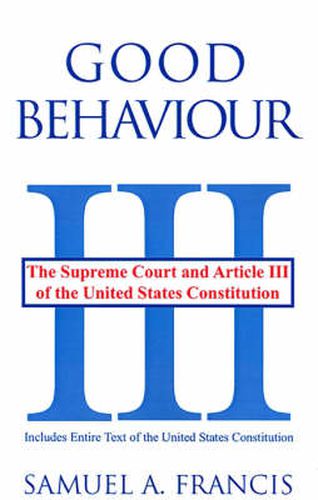Readings Newsletter
Become a Readings Member to make your shopping experience even easier.
Sign in or sign up for free!
You’re not far away from qualifying for FREE standard shipping within Australia
You’ve qualified for FREE standard shipping within Australia
The cart is loading…






This title is printed to order. This book may have been self-published. If so, we cannot guarantee the quality of the content. In the main most books will have gone through the editing process however some may not. We therefore suggest that you be aware of this before ordering this book. If in doubt check either the author or publisher’s details as we are unable to accept any returns unless they are faulty. Please contact us if you have any questions.
The controversy surrounding the presidential election in 2000 raised many issues regarding the behavior of some of the United States Supreme Court Justices. The Court’s decision in the case of Bush v. Gore effectively stopped a recount of votes in Florida. Many critics felt this decision was politically motivated. If so, what did this say about the ability of the members of the Court to remain non-partisan? And, can justices be removed from office even though it is assumed that they are appointed for life? Samuel A. Francis, an Albuquerque, New Mexico attorney examines all these issues and takes a hard look at what good Behaviour (original spelling) in Article III of the United States Constitution might mean for the justices in light of events of December 2000. In this concise book, the author also gives a brief history of the Supreme Court, a detailed appraisal of the case of Bush v. Gore, and includes the full text to the United States Constitution. * * * SAMUEL A. FRANCIS received his Bachelor’s degree in political science from the University of New Mexico in 1963. He then earned his Juris Doctor degree from the University of New Mexico Law School in 1966. This is his first published work.
$9.00 standard shipping within Australia
FREE standard shipping within Australia for orders over $100.00
Express & International shipping calculated at checkout
This title is printed to order. This book may have been self-published. If so, we cannot guarantee the quality of the content. In the main most books will have gone through the editing process however some may not. We therefore suggest that you be aware of this before ordering this book. If in doubt check either the author or publisher’s details as we are unable to accept any returns unless they are faulty. Please contact us if you have any questions.
The controversy surrounding the presidential election in 2000 raised many issues regarding the behavior of some of the United States Supreme Court Justices. The Court’s decision in the case of Bush v. Gore effectively stopped a recount of votes in Florida. Many critics felt this decision was politically motivated. If so, what did this say about the ability of the members of the Court to remain non-partisan? And, can justices be removed from office even though it is assumed that they are appointed for life? Samuel A. Francis, an Albuquerque, New Mexico attorney examines all these issues and takes a hard look at what good Behaviour (original spelling) in Article III of the United States Constitution might mean for the justices in light of events of December 2000. In this concise book, the author also gives a brief history of the Supreme Court, a detailed appraisal of the case of Bush v. Gore, and includes the full text to the United States Constitution. * * * SAMUEL A. FRANCIS received his Bachelor’s degree in political science from the University of New Mexico in 1963. He then earned his Juris Doctor degree from the University of New Mexico Law School in 1966. This is his first published work.